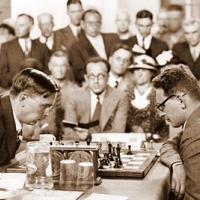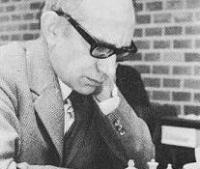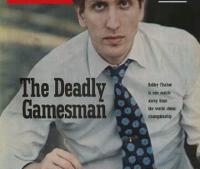
From Amateur to World Champion
Early Years
Max Euwe was born on the 20th of May 1901 in the town of Watergraafsmeer near Amsterdam. He was the second of six children and learned the game at the age of 4 from his parents.
At 15 years old he qualified for the Championship Group B of the Netherlands where he won the first prize of his career: 25 Fl. At that time there lived in Holland famous masters: Reti, Tartakokower, Tarrasch, and Maroczy who was always a teacher and friend.
In 1918 he joined the faculty of mathematics at the University of Amsterdam; he graduated with honors in 1923. He earned his PhD in mathematics in 1926. In 1921 he won the national championship of the Netherlands; he would win it eleven more times in his career, a record.
A Flurry of Chess
Despite his math career, from 1926 to 1934, Max Euwe played a large number of serious events, with excellent results. In 1926 he played a training match with Alexander Alekhine and narrowly lost with 2 wins, 5 draws and 3 losses. In 1928 defeated Edgar Colle in a match with 5 wins and 1 draw. A few days later he played with Efim Bogoljubov in a match and lost, scoring 2 wins, 5 draws, and 3 losses, In August, 1928 he won the world amateur championship, played at The Hague. In 1930 he took first place at Hastings, ahead of Capablanca, with 6 wins, 2 draws, and 1 loss. He then played with Capablanca in a match, but lost with 8 draws and 2 losses, took 2nd at Bern 1932 with 8 wins and 7 draws. He then drew a match with Salo Flohr with 3 wins, 10 draws, and 3 losses. He won a training match with Rudolf Spielmann in 1932, with 2 wins and 2 draws, took 2nd place in Zurich 1934, tied for first place with Flohr and Thomas at Hastings 1934.
World Champion!
In October-December, 1935 Euwe played with Alexander Alekhine for the world championship and, to the surprise of everyone, won. The match was held in Amsterdam, The Hague, Delft, Rotterdam, Utrecht, Gouda, Groningen, Baarn, Hertogenbosch, Eindhoven, Zeist, Ermelo, and Zandvoort. There were 13 different locations for this world championship match! Euwe won 9 games, drew 13, and lost 8 to become the 5th official world chess champion.
At Zandvoort 1936, world champion Euwe came in second place, behind Reuben Fine, with 5 wins, 5 draws, and 1 loss. He took 3rd place at Nottingham 1936, behind Capablanca and Botvinnik and tied for first at Amsterdam 1936 with Fine; in 1937 he took first place at Bad Nauheim-Stuttgart-Garmisch, ahead of Alekhine, winning 3, drawing 2, and losing 1 game. From 1935 until their rematch in 1937, Max Euwe scored two wins and one draw against Alekhine; however, he lost the title to Alekhine in a rematch in 1937, also played in The Netherlands.
He played for The Netherlands in a total of seven Chess Olympiads, from 1927 to 1962, a 35-year-span, always on first board. He scored 10½/15 at London 1927, 9½/13 at Stockholm 1937 for a bronze medal, 8/12 at Dubrovnik 1950, 7½/13 at Amsterdam 1954, 8½/11 at Munich 1958 for a silver medal at age of 57, 6½/16 at Leipzig 1960, and finally 4/7 at Varna 1962. His aggregate was 54½/87 for 62.6 per cent.
FIDE President
From 1970 (when he was 69 years old) until 1978, he was president of the FIDE. As president Euwe usually did what he considered morally right rather than what was politically expedient. On several occasions this brought him into conflict with the Soviet Chess Federation, which thought it had the right to call the shots because it contributed a very large share of FIDE's budget and Soviet players dominated the world rankings.
Legacy
Euwe wrote a lot of chess books, far more than any other World Champion; some of the best-known are The Road to Chess Mastery, Judgment and Planning in Chess, The Logical Approach to Chess, and Strategy and Tactics in Chess Play. Former Soviet grandmaster Gennady Sosonko used Euwe's Practical Chess Lessons as a textbook when teaching in the Leningrad House of Pioneers, and considers it "one of the best chess books ever."
Euwe died in Amsterdam on November 26, 1981.
"The fact that, even without being a professional he beat Alekhine can be regarded as a feat both creative and competitive." (Spassky)






